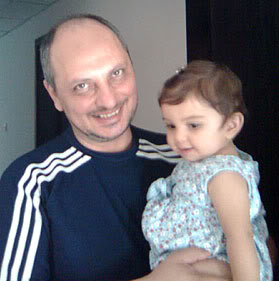by Reem Salahi
Naji Hamdan shuffled into the prisoner visitation area wearing a dark blue prisoner jumpsuit. He was thin and pale, a consequence of having been detained incommunicado, tortured and subsequently imprisoned at Al Wathba Prison in Abu Dhabi since August 26, 2008. His eyes were bloodshot and his hands quivered as a result of the torture he underwent. As he motioned for me to sit opposite the glass barrier, he looked around nervously. Just as I was about to sit, he signaled that we sit in another part of the visitation area, in a corner. Again he looked around nervously. Throughout the conversation, Naji would often pause and look around, in a seemingly yet understandably paranoid fashion. As soon as I sat down and picked up the phone, three men dressed in traditional Emirati outfits who had previously been lounging around the visitation area, sat next to me. One of the men stood over my head and leaned against the wall, apparently trying to act inconspicuous. Reading my thoughts, Naji nodded and mouthed that these men were U.A.E. State Security personnel.
Speaking quickly, I introduced myself. I was a lawyer at the American Civil Liberties Union (ACLU) of Southern California. I was working on his habeas case in the U.S. He smiled a grimace in response and thanked me for coming. And so began my meeting with Naji Hamdan, a meeting which I had almost given up hope in having after nearly two weeks of promised and denied access.

Naji Hamdan, before he was arrested and tortured in the UAE.
During the course of our conversation, Naji told me grueling accounts of the torture he endured while in U.A.E. custody. He also gave me a detailed description of the American interrogator. From underneath his blindfold, Naji could see the man who approached him forty-five minutes into one of his daily torture sessions. Unlike the other interrogators who wore traditional Emirati sandals or military boots, this man wore dress shoes and slacks. He had been in the room the entire time and had witnessed the interrogators who repeatedly kicked Naji in his liver area and all over his body. He had also seen the interrogators push Naji’s face into the ground on multiple occasions as they yelled at Naji to eat the dirt floor. The American approached Naji and spoke with a clear American accent. He told Naji that he was not the only one with a Masters Degree in the room and that Naji better cooperate with the local interrogators or else they would “f**k him up.” When Naji agreed to cooperate if the American would help him, the American smirked and asked Naji if he would even trust the American to help him out.

Naji Hamdan's oldest son Khaled Hamdan, age 17. Taken at the sentencing trial on October 14th, 2009.
Naji, a U.S. citizen who lived mostly in Hawthorne, California for over twenty years and ran a highly-successful auto parts business there, is at the center of one of the most unfortunate and unusual cases stemming from the Bush administration’s so-called war on terror. After moving to the U.A.E. in 2006 for business and family reasons, Naji was picked up by local State Security forces and tortured for over three months. One week after the ACLU filed a habeas petition on his behalf, Naji was transferred from an unknown location to Al Wathba Prison and put on trial before the U.A.E. Supreme Court on vague “terrorism-related” charges. Earlier this month, Naji was convicted by the U.A.E. Supreme Court on the undefined crime of terrorism based solely on his confessions procured under torture. And the punishment for this horrid crime? Eighteen months, which ever so conveniently converts to time served.
Yet Naji’s upcoming release, despite his conviction of nothing less than terrorism, is not a sign of good fortune. Rather, it is yet another sad tale of an innocent Muslim man wrongly picked up at the behest of the United States and placed at the mercy of an authoritarian government which lacks both the rule of law and prohibitions against torture. Similar to Maher Arar, Binyam Mohamed and Saud Memon, who were also victims to the U.S.’s extrajudicial tactics, disappearing into legal black holes only to be inexplicably reappear months, if not years later, Naji will soon be released without ever understanding why he was detained, tortured and imprisoned in the first place. For Naji and those who represent him, his upcoming release only reaffirms that the real criminals are those in the U.S. government who have unofficially legalized the policies of rendition, proxy detention and torture by proxy.
After two and a half hours, a prison guard came up to me and told me to get off the phone. It was time for me to go. As I sat there and looked at Naji, I tried to hold back the tears that burned in my eyes. I was sad to see Naji look so helpless in his prison outfit, but more so, I was ashamed that my government had fallen so low as to disregard the civil liberties of its citizens and outsource its fundamental duties of due process. As I was about to leave the visitation area, I looked once again through the glass barrier and saw Naji from a distance waving goodbye. “Thank you,” he mouthed.
Salahi is an attorney specializing in national security and civil rights.

[…] Source […]
Truly a sad and moving story. Knowing that this has happened in our lifetime, on the same soil that many of us live upon – still shocking, despite plenty of news on these cases making the rounds. Jazak’Allah for sharing.
لا حول ولا قوة الا بالله…
speechless.
Thanks Reem. It’s great work you are doing. Please be safe.
I was very sad to read Reem Salahi’s story about the treatment of Naji Hamdan in UAE. My friend, Farid Hilali, also suffered torture in UAE – the difference being that a British Intelligence agent questioned him between torture sessions. Here is a link to Farid’s story here – http://www.cageprisoners.com/articles.php?id=29568.
As Ahmed says “there are plenty of these stories making the rounds” and I believe each one should be highlighted.